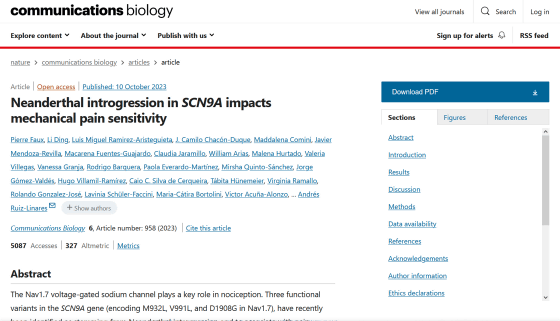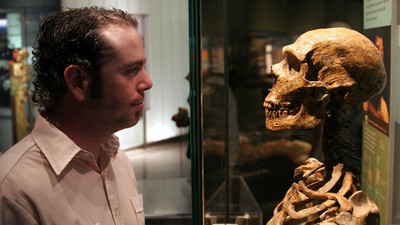Research results show that ``DNA inherited from Neanderthals'' influences pain sensitivity of modern people

It is known that
Neanderthal introgression in SCN9A impacts mechanical pain sensitivity | Communications Biology
https://www.nature.com/articles/s42003-023-05286-z

Neanderthal DNA may shape how sensitive you are to pain, genetic analysis shows | Live Science
https://www.livescience.com/health/genetics/neanderthal-dna-may-shape-how-sensitive-you-are-to-pain-genetic-analysis-shows
Homo sapiens once interbred with Neanderthals, and it is known that some of their genes have been passed down to modern humans. A 2020 study showed that genes inherited from Neanderthals are associated with the severity of the new coronavirus infection (COVID-19).
Possibility that DNA inherited by humans from Neanderthals 60,000 years ago is related to ``severe severity of new coronavirus infection'' - GIGAZINE

An international research team from Europe and South America analyzed genetic samples collected from more than 5,900 people living in Brazil, Chile, Colombia, Mexico, and Peru. On average, participants had 46% Native American ancestry, 49.6% European ancestry, and 4.4% African ancestry, but these proportions varied widely among individuals.
The research team focused on a gene called SCN9A , which encodes a sodium channel called Nav1.7 that transports sodium into cells and helps transmit signals from pain-sensing nerves. It has been found that people with any of the three genetic mutations found in SCN9A are more sensitive to pain from being poked with sharp objects, but not pain caused by heat or pressure. It is also believed that all of these genetic mutations were inherited from Neanderthals.
As a result of the analysis, it was found that approximately 30% of the subjects had the SCN9A gene mutation called 'D1908G', and approximately 13% had two other gene mutations called 'V991L' or 'M932L'. In particular, subjects from Peru, where many people have Native American ancestry, had the highest proportion of these genetic mutations. Conversely, subjects from Brazil, which has the least amount of Native American ancestry, were reported to have the lowest proportion of genetic variants.
'Modern humans and Neanderthals interbred between 50,000 and 70,000 years ago,' said Pierre Faux, lead author of the paper and a geneticist at France's National Institute for Agriculture, Food and the Environment (INRAE). , modern humans migrated from the Eurasian continent to the Americas about 15,000 to 20,000 years ago. Neanderthal genetic mutations are frequently seen in people whose ancestors were indigenous Americans. 'One possible explanation is that Neanderthals with these mutations interbred with modern humans who later migrated to the Americas.'

by
The research team then tested over 1,600 volunteers living in Colombia to determine their pain sensitivity. Fifty-six percent of the subjects were female, and their ancestry averaged 31% Native American, 59% European, and 9.7% African.
The test involved applying an irritant oil to the skin of the forearm, then applying strong pressure with a plastic rod. As a result of the test, it was found that subjects with a genetic mutation derived from Neanderthals felt pain with significantly less force than those without the gene mutation.
'When we tested subjects' pain thresholds by applying pressure, heat, and cold, the genetic mutation did not affect their pain sensitivity,' Fo said. only affected the response to needle-prick pressure.' It is unclear whether these genetic mutations conferred an evolutionary advantage on humans, but the researchers say they may have helped humans survive in some way, and the increased pain sensitivity may have been an evolutionary side effect. is thinking.

Related Posts:







